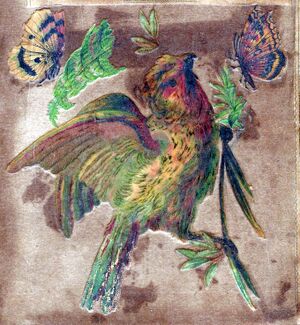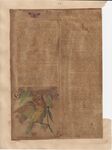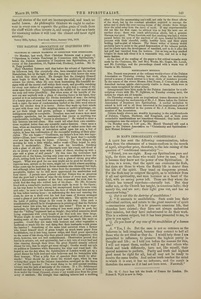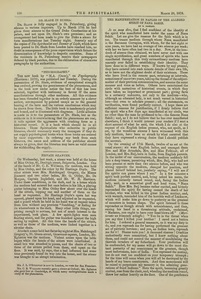HPB-SB-7-56: Difference between revisions
(Created page with "{{HPB-SB-header | volume =7 | page =56 | image = SB-07-056.jpg | notes = }} {{HPB-SB-item | volume =7 | page =56 | item =1 | type = image | file = | status = wanted...") |
mNo edit summary |
||
| (3 intermediate revisions by 2 users not shown) | |||
| Line 11: | Line 11: | ||
| item =1 | | item =1 | ||
| type = image | | type = image | ||
| file = | | file = SB-07-056-1.jpg | ||
| status = | | image size = 100px | ||
| status = ok | |||
| author = | | author = | ||
| title = | | title = | ||
| Line 20: | Line 21: | ||
| hide = yes | | hide = yes | ||
}} | }} | ||
{{HPB-SB-item | {{HPB-SB-item | ||
| Line 26: | Line 28: | ||
| item =2 | | item =2 | ||
| type = article | | type = article | ||
| status = | | status = proofread | ||
| continues = | | continues = | ||
| author = | | author = | ||
| Line 32: | Line 34: | ||
| subtitle = | | subtitle = | ||
| untitled = | | untitled = | ||
| source title =Spiritualist | | source title = London Spiritualist | ||
| source details = | | source details = No. 292, March 29, 1878, p. 149 | ||
| publication date = | | publication date =1878-03-29 | ||
| original date = | | original date = | ||
| notes = | | notes = | ||
| categories = | | categories = | ||
}} | }} | ||
... | {{Style S-Small capitals|A Lady}} has sent the following communication, taken down from the utterances of a trance-medium in the month of April, altogether prior, therefore, to the late raising of the question of “conditional immortality”: — | ||
“Friend, you are right. Keep our Spiritualism pure and high, for there are those who would lower its uses. But it is because they know not the power of true Spiritualism. It is true, in a sense, that the spirit can overcome the flesh, but there are those to whom the fleshly life is dearer than the life of the spirit. They tread on dangerous ground. For the flesh may so outgrow the spirit, as to withdraw from it all real spirituality, and man becomes as a beast of the field, with no saving power left. These are they whom the Church has termed reprobate—eternally lost. But they suffer not, as the Church has taught, in conscious hells; they merely die, and are not; their light goes out, and has no conscious being.” | |||
''Q. But is not this the doctrine of annihilation?'' | |||
''A. ''“It amounts to annihilation. Such souls lose their individual entities, and return to the great reservoir of spirit—unconscious spirit. It is to preserve conscious life, that churches have existed; they have not always understood their mission, but they have endeavoured to do their work. This is a solemn subject, but it has been presented to me, to give to you again.” | |||
''Q. Do you know of any case of the annihilation of a human'' ''soul?'' | |||
''A. ''“Yes, I do. But the case is not so common as the believers in hell imagined, because they commit to hell all those who do not ''think ''as they do. I would help those I am permitted to influence, to preserve the highest purity in thought and life; as I told you before the reasons for this, I will not repeat them, neither will I say that others who think and teach differently, have not, like myself, their special missions to perform. Purity and truth and highest good must be right for all, but all may not be ready to receive the same truths. And unless truth reaches the mind to which it is sent, it has no influence, and the result is therefore the same as if it had not been sent. Farewell.” | |||
| Line 48: | Line 60: | ||
| item =3 | | item =3 | ||
| type = image | | type = image | ||
| file = | | file = SB-07-056-3.jpg | ||
| status = | | image size = 300px | ||
| status = ok | |||
| author = | | author = | ||
| title = | | title = | ||
| Line 57: | Line 70: | ||
| hide = yes | | hide = yes | ||
}} | }} | ||
{{HPB-SB-item | {{HPB-SB-item | ||
| Line 63: | Line 77: | ||
| item =4 | | item =4 | ||
| type = article | | type = article | ||
| status = | | status = proofread | ||
| continues = | | continues =57, 58 | ||
| author =Damiani G. | | author =Damiani, G. | ||
| title =The Manifestations in Naples of the Alleged Spirit of | | title =The Manifestations in Naples of the Alleged Spirit of Nana Sahib | ||
| subtitle = | | subtitle = | ||
| untitled = | | untitled = | ||
| source title =Spiritualist | | source title = London Spiritualist | ||
| source details = | | source details = No. 292, March 29, 1878, pp. 150-1 | ||
| publication date = | | publication date = 1878-03-29 | ||
| original date = | | original date = | ||
| notes = | | notes = | ||
| categories = | | categories = | ||
}} | }} | ||
... | ''Je va sans dire, ''that I feel confident of the identity of the spirit who manifested here under the name of Nana Sahib. Let me give the reasons for the faith which is in me. The trance medium through whom Nana manifested is the Baroness Cerrapica, with whom, for the last eight or nine years, we have had an average of two ''seances ''per week; with her we have often had two in a day. Now, in the hundreds of ''seances ''thus obtained, we have never met with one single mystification, and great numbers of spirits who have manifested through this truly extraordinary medium have scarcely ever failed in establishing their identity. They have done 'so in different ways. If known by any present, they have entered into such minute details of their own life, as to leave not the slightest doubt of their existence. Those who have lived in the remote past, returning at intervals, sometimes of one or two years, take up the thread of the subject matter of their previous communication, and assume the same manner and voice as before. Others have entertained the circle with narratives of historical events, in which they have taken an important or prominent part; giving facts to a certainty unknown, not only to the medium—who, although an educated lady, is not much versed in historical lore—but even to scholars present; all the statements, on verification, were found perfectly correct. I hope these are sufficient reasons for justification, if I firmly believe that the spirit who a few days ago manifested at my circle, was no other than the man he professed to be—the famous Nana Sahib; and, as I do not believe that he has ever manifested elsewhere, I think it would interest your readers if I sent a short account of what he said, the which I do also at the request of six English ladies present, who, not spoilt, as I am, by the wondrous ''seances ''I have witnessed with this lady medium, have been so struck by what occurred that they have expressed a strong desire that I should publish the account. | ||
On the evening of 17th March, twelve of us sat at the usual ''stance; ''six were English ladies, and amongst them Mrs. and Miss Arundale, Mrs. and Miss Folkiner, all of London, and Mrs. Beij, born in India, from English parents. In the midst of our conversation, the medium suddenly fell into a deep trance, perceiving which, Mrs. Beij, who had not been present at more than two ''stances ''before, and who was sitting opposite the medium, changed her position, and placed herself behind her, jocularly saying, “I will see if the spirits can guess where I am.” In a few minutes a spirit took perfect control, and, being asked his name, the medium instantly turned round, and, facing the Indian lady, said, in a somewhat gruff and loud voice, “Nana Sahib.” Here Mrs. Beij became rather excited, and bitterly reproached the spirit for having caused the death of her brother, who was killed in the great Indian mutiny, and, with warmth, reminded him of the horrible well of Lucknow, which will make him go down to posterity as the greatest of monsters in human shape. The spirit listened to these reproaches as though struck with astonishment, and then, raising his hand in a threatening attitude, exclaimed, “Madame, you ought to have your head blown off.” ''(Meritereste un tremendo schiaffo.) ''“You lie in the throat when you say that I killed your brother! I cared not a button for him. I ordered a general massacre, as it was my duty to do, and you reproach me for having performed the greatest act of patriotic heroism; and you, an Indian born, reproach me for it! Shame unto you! A thousand shames! Cruelties undoubtedly were committed, but I knew nothing about them, and could not control the manner of annihilating the thievish invaders of my fatherland. Your prediction will be confounded, for my name will go down to the most distant posterity of my countrymen as the greatest, though most unfortunate, hero of India. You repressed the mutiny, but do not rest too confident on your temporary triumph; for the time will come when you will all be destroyed by the hands of my brave countrymen. And then monuments will be raised to perpetuate my memory in the admiring gene rations of freed Indians.” Here the spirit, becoming greatly I excited, rose from the chair, and, wheeling the medium round, threw her rather heavily on the floor. One of the gentlemen {{Style S-HPB SB. Continues on |7-57}} | |||
{{HPB-SB-footer-footnotes}} | |||
{{HPB-SB-footer-sources}} | |||
<gallery widths=300px heights=300px> | |||
london_spiritualist_n.292_1878-03-29.pdf|page=7|London Spiritualist, No. 292, March 29, 1878, p. 149 | |||
london_spiritualist_n.292_1878-03-29.pdf|page=8|London Spiritualist, No. 292, March 29, 1878, pp. 150-1 | |||
</gallery> | |||
Latest revision as of 16:18, 6 March 2024

Is Man's Immortality Conditional
A Lady has sent the following communication, taken down from the utterances of a trance-medium in the month of April, altogether prior, therefore, to the late raising of the question of “conditional immortality”: —
“Friend, you are right. Keep our Spiritualism pure and high, for there are those who would lower its uses. But it is because they know not the power of true Spiritualism. It is true, in a sense, that the spirit can overcome the flesh, but there are those to whom the fleshly life is dearer than the life of the spirit. They tread on dangerous ground. For the flesh may so outgrow the spirit, as to withdraw from it all real spirituality, and man becomes as a beast of the field, with no saving power left. These are they whom the Church has termed reprobate—eternally lost. But they suffer not, as the Church has taught, in conscious hells; they merely die, and are not; their light goes out, and has no conscious being.”
Q. But is not this the doctrine of annihilation?
A. “It amounts to annihilation. Such souls lose their individual entities, and return to the great reservoir of spirit—unconscious spirit. It is to preserve conscious life, that churches have existed; they have not always understood their mission, but they have endeavoured to do their work. This is a solemn subject, but it has been presented to me, to give to you again.”
Q. Do you know of any case of the annihilation of a human soul?
A. “Yes, I do. But the case is not so common as the believers in hell imagined, because they commit to hell all those who do not think as they do. I would help those I am permitted to influence, to preserve the highest purity in thought and life; as I told you before the reasons for this, I will not repeat them, neither will I say that others who think and teach differently, have not, like myself, their special missions to perform. Purity and truth and highest good must be right for all, but all may not be ready to receive the same truths. And unless truth reaches the mind to which it is sent, it has no influence, and the result is therefore the same as if it had not been sent. Farewell.”

The Manifestations in Naples of the Alleged Spirit of Nana Sahib
Je va sans dire, that I feel confident of the identity of the spirit who manifested here under the name of Nana Sahib. Let me give the reasons for the faith which is in me. The trance medium through whom Nana manifested is the Baroness Cerrapica, with whom, for the last eight or nine years, we have had an average of two seances per week; with her we have often had two in a day. Now, in the hundreds of seances thus obtained, we have never met with one single mystification, and great numbers of spirits who have manifested through this truly extraordinary medium have scarcely ever failed in establishing their identity. They have done 'so in different ways. If known by any present, they have entered into such minute details of their own life, as to leave not the slightest doubt of their existence. Those who have lived in the remote past, returning at intervals, sometimes of one or two years, take up the thread of the subject matter of their previous communication, and assume the same manner and voice as before. Others have entertained the circle with narratives of historical events, in which they have taken an important or prominent part; giving facts to a certainty unknown, not only to the medium—who, although an educated lady, is not much versed in historical lore—but even to scholars present; all the statements, on verification, were found perfectly correct. I hope these are sufficient reasons for justification, if I firmly believe that the spirit who a few days ago manifested at my circle, was no other than the man he professed to be—the famous Nana Sahib; and, as I do not believe that he has ever manifested elsewhere, I think it would interest your readers if I sent a short account of what he said, the which I do also at the request of six English ladies present, who, not spoilt, as I am, by the wondrous seances I have witnessed with this lady medium, have been so struck by what occurred that they have expressed a strong desire that I should publish the account.
On the evening of 17th March, twelve of us sat at the usual stance; six were English ladies, and amongst them Mrs. and Miss Arundale, Mrs. and Miss Folkiner, all of London, and Mrs. Beij, born in India, from English parents. In the midst of our conversation, the medium suddenly fell into a deep trance, perceiving which, Mrs. Beij, who had not been present at more than two stances before, and who was sitting opposite the medium, changed her position, and placed herself behind her, jocularly saying, “I will see if the spirits can guess where I am.” In a few minutes a spirit took perfect control, and, being asked his name, the medium instantly turned round, and, facing the Indian lady, said, in a somewhat gruff and loud voice, “Nana Sahib.” Here Mrs. Beij became rather excited, and bitterly reproached the spirit for having caused the death of her brother, who was killed in the great Indian mutiny, and, with warmth, reminded him of the horrible well of Lucknow, which will make him go down to posterity as the greatest of monsters in human shape. The spirit listened to these reproaches as though struck with astonishment, and then, raising his hand in a threatening attitude, exclaimed, “Madame, you ought to have your head blown off.” (Meritereste un tremendo schiaffo.) “You lie in the throat when you say that I killed your brother! I cared not a button for him. I ordered a general massacre, as it was my duty to do, and you reproach me for having performed the greatest act of patriotic heroism; and you, an Indian born, reproach me for it! Shame unto you! A thousand shames! Cruelties undoubtedly were committed, but I knew nothing about them, and could not control the manner of annihilating the thievish invaders of my fatherland. Your prediction will be confounded, for my name will go down to the most distant posterity of my countrymen as the greatest, though most unfortunate, hero of India. You repressed the mutiny, but do not rest too confident on your temporary triumph; for the time will come when you will all be destroyed by the hands of my brave countrymen. And then monuments will be raised to perpetuate my memory in the admiring gene rations of freed Indians.” Here the spirit, becoming greatly I excited, rose from the chair, and, wheeling the medium round, threw her rather heavily on the floor. One of the gentlemen <... continues on page 7-57 >
Editor's notes
- ↑ image by unknown author. colored butterfly
- ↑ Is Man's Immortality Conditional by unknown author, London Spiritualist, No. 292, March 29, 1878, p. 149
- ↑ image by unknown author. colored draw
- ↑ The Manifestations in Naples of the Alleged Spirit of Nana Sahib by Damiani, G., London Spiritualist, No. 292, March 29, 1878, pp. 150-1
Sources
-
London Spiritualist, No. 292, March 29, 1878, p. 149
-
London Spiritualist, No. 292, March 29, 1878, pp. 150-1



